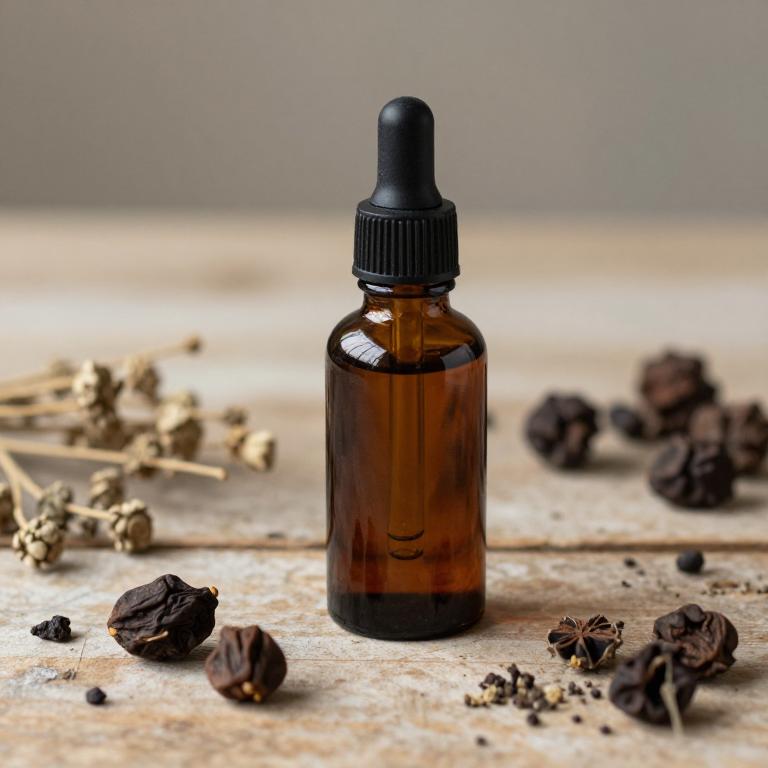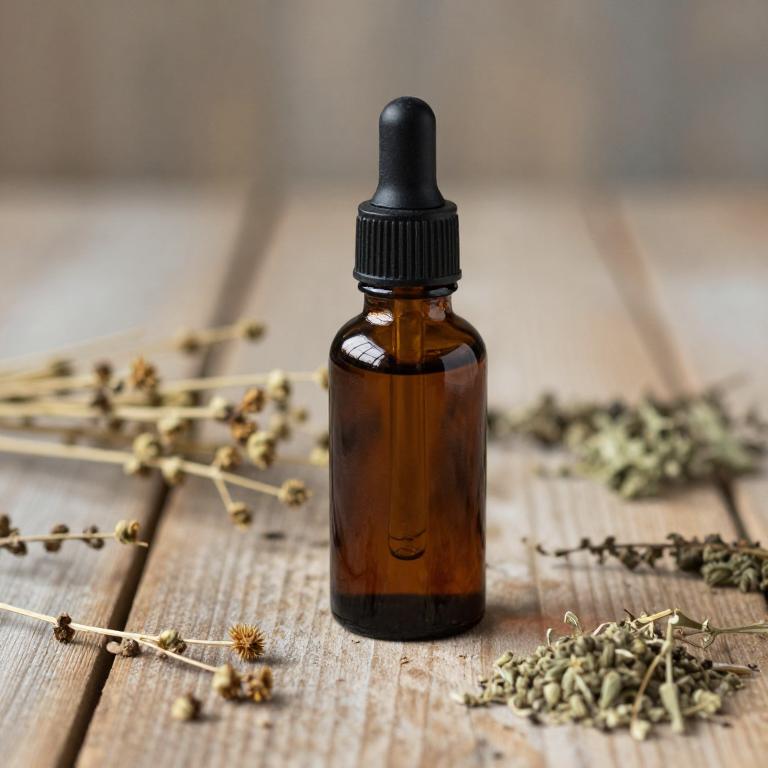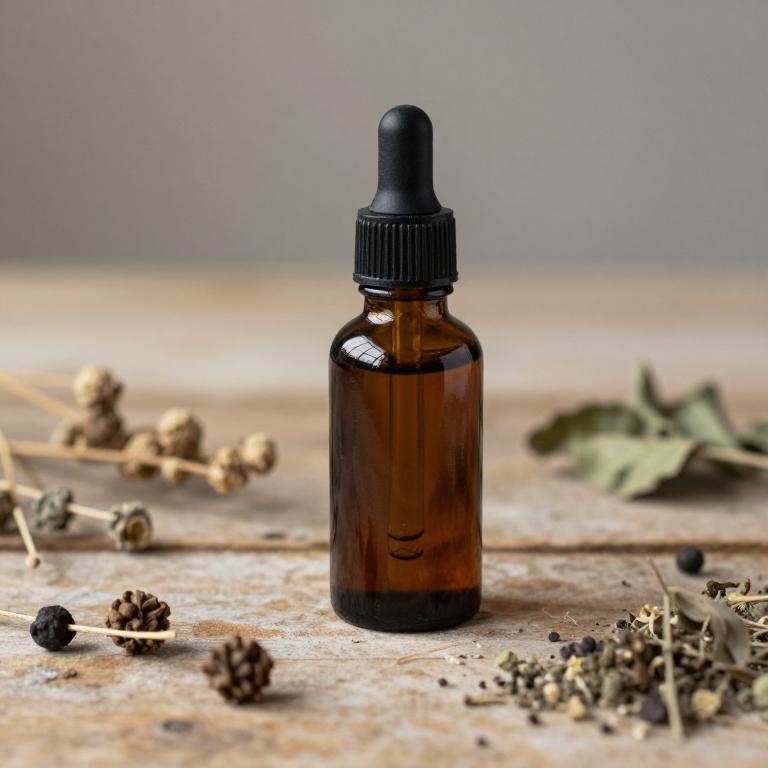10 Best Herbal Tinctures For Gastroparesis

Herbal tinctures have gained attention as potential complementary therapies for managing symptoms of gastroparesis, a condition characterized by delayed gastric emptying.
Certain herbs, such as ginger, peppermint, and licorice root, are commonly used in tincture form to support digestion and alleviate nausea and bloating. These tinctures work by stimulating digestive enzymes, reducing inflammation, and promoting motility in the gastrointestinal tract. While some studies suggest they may offer symptomatic relief, their efficacy can vary, and they should not replace conventional medical treatments.
It is important for individuals with gastroparesis to consult with a healthcare provider before incorporating herbal tinctures into their treatment regimen.
Table of Contents
- 1. Thistle (Silybum marianum)
- 2. Ginger (Zingiber officinale)
- 3. Fennel (Foeniculum vulgare)
- 4. Licorice (Glycyrrhiza glabra)
- 5. Turmeric (Curcuma longa)
- 6. Black pepper (Piper nigrum)
- 7. Peppermint (Mentha piperita)
- 8. Cumin (Cuminum cyminum)
- 9. Chaste tree (Vitex agnus-castus)
- 10. Ceylon cinnamon (Cinnamomum verum)
1. Thistle (Silybum marianum)

Silybum marianum, commonly known as milk thistle, is a herbal remedy that has been studied for its potential benefits in managing gastroparesis, a condition characterized by delayed gastric emptying.
The active compound in milk thistle, silymarin, is believed to support liver function and may have anti-inflammatory and antioxidant properties that could aid in gastrointestinal health. Some research suggests that silybum marianum tinctures might help improve digestion and reduce symptoms such as nausea and bloating in individuals with gastroparesis. However, while preliminary studies show promise, more clinical trials are needed to fully establish its efficacy and safety for this specific condition.
As with any herbal supplement, it is important to consult a healthcare provider before use, especially for those with existing medical conditions or taking other medications.
2. Ginger (Zingiber officinale)

Zingiber officinale, commonly known as ginger, has been widely used in herbal tinctures for its potential benefits in managing gastroparesis, a condition characterized by delayed gastric emptying.
The active compounds in ginger, such as gingerols and shogaols, are believed to possess anti-inflammatory, antioxidant, and prokinetic properties that may help improve gut motility. Herbal tinctures made from fresh or dried ginger can be prepared at home or purchased from health stores, offering a natural alternative for symptom relief. These tinctures are often recommended as a complementary therapy alongside conventional treatments, though they should be used under the guidance of a healthcare professional.
Despite their popularity, individual responses to ginger can vary, and some people may experience gastrointestinal discomfort, emphasizing the need for personalized approach and monitoring.
3. Fennel (Foeniculum vulgare)

Foeniculum vulgare, commonly known as fennel, is often used in herbal tinctures to support digestive health, including in the management of gastroparesis.
The tincture form of fennel is valued for its potential to stimulate digestive enzymes and reduce gastrointestinal discomfort. It is believed to help alleviate symptoms such as bloating, nausea, and delayed gastric emptying by promoting motility in the digestive tract. However, while some anecdotal evidence suggests its efficacy, more clinical research is needed to confirm its benefits for gastroparesis.
As with any herbal remedy, it should be used under the guidance of a healthcare professional to ensure safety and proper integration into a comprehensive treatment plan.
4. Licorice (Glycyrrhiza glabra)

Glycyrrhiza glabra, commonly known as licorice root, is often used in herbal tinctures to support digestive health, including in the management of gastroparesis.
The tinctures contain glycyrrhizin, a compound with anti-inflammatory and antispasmodic properties that may help reduce stomach irritation and improve motility. Some studies suggest that licorice root may stimulate digestive enzymes and enhance gastric emptying, which are critical for individuals with gastroparesis. However, prolonged use of licorice tinctures can lead to side effects such as hypertension and fluid retention due to its mineralocorticoid-like effects.
As a result, it is typically recommended as a complementary therapy under the guidance of a healthcare professional.
5. Turmeric (Curcuma longa)

Curcuma longa, commonly known as turmeric, has been used for centuries in traditional medicine for its anti-inflammatory and antioxidant properties.
Herbal tinctures made from Curcuma longa are being explored as a complementary therapy for individuals suffering from gastroparesis, a condition characterized by delayed gastric emptying. These tinctures may help reduce inflammation in the gastrointestinal tract and support digestive function by enhancing the production of digestive enzymes. However, while preliminary studies show promise, more clinical research is needed to confirm their efficacy and safety for this specific condition.
As with any herbal supplement, it is important to consult a healthcare provider before use, especially for those with existing medical conditions or taking other medications.
6. Black pepper (Piper nigrum)

Piper nigrum, commonly known as black pepper, has been traditionally used in herbal medicine for its potential digestive benefits, and its tincture may offer support for individuals with gastroparesis.
The active compound in black pepper, piperine, is believed to enhance gastrointestinal motility by stimulating digestive enzymes and improving the movement of food through the digestive tract. While research on its specific effects on gastroparesis is limited, some studies suggest that piperine may help reduce inflammation and improve gut motility, which are key factors in managing this condition. Herbal tinctures made from Piper nigrum are often used as a complementary therapy alongside conventional treatments, though they should be used under the guidance of a healthcare professional.
As with any herbal remedy, individual responses can vary, and it is important to consult a physician before incorporating Piper nigrum tinctures into a treatment plan for gastroparesis.
7. Peppermint (Mentha piperita)

Mentha piperita, commonly known as peppermint, has been traditionally used in herbal medicine to support digestive health, and its essential oils are often incorporated into tinctures for individuals with gastroparesis.
These tinctures may help alleviate symptoms such as bloating, nausea, and abdominal discomfort by stimulating digestive secretions and relaxing the smooth muscles of the gastrointestinal tract. While peppermint oil has a calming effect on the gut, it should be used cautiously, as it can sometimes cause heartburn in sensitive individuals. When used under the guidance of a healthcare provider, mentha piperita tinctures may serve as a complementary therapy to conventional treatments for gastroparesis.
Overall, they offer a natural approach to managing digestive symptoms, though their efficacy can vary depending on individual response and dosage.
8. Cumin (Cuminum cyminum)

Cuminum cyminum, commonly known as cumin, has been traditionally used in herbal medicine for its digestive benefits, and its tincture form may offer potential support for individuals with gastroparesis, a condition characterized by delayed stomach emptying.
The essential oils in cumin tinctures, such as limonene and cineole, may help stimulate gastrointestinal motility and reduce bloating by promoting healthy digestive function. While scientific research on cumin's specific effects on gastroparesis is limited, some studies suggest that its carminative and anti-inflammatory properties may alleviate symptoms associated with digestive discomfort. It is important to consult with a healthcare provider before using cumin tinctures, as they may interact with medications or have contraindications for certain individuals.
Overall, cumin tinctures may serve as a complementary therapy to support digestive health in those managing gastroparesis, though they should not replace conventional medical treatments.
9. Chaste tree (Vitex agnus-castus)

Vitex agnus-castus, commonly known as chasteberry, is a herbal tincture that has been traditionally used to support hormonal balance and digestive function.
While primarily recognized for its effects on menstrual health, some studies suggest that vitex may help improve gastrointestinal motility, making it a potential complementary therapy for individuals with gastroparesis. The herb is believed to influence the release of digestive hormones such as gastrin, which can aid in stomach emptying. However, it is important to note that scientific evidence supporting its efficacy for gastroparesis is limited, and it should be used under the guidance of a healthcare professional.
As with any herbal remedy, individual responses can vary, and it is often recommended to combine vitex with other treatments for optimal results.
10. Ceylon cinnamon (Cinnamomum verum)

Cinnamomum verum, commonly known as true cinnamon, has been traditionally used in herbal medicine for its potential therapeutic effects on digestive health.
Herbal tinctures made from Cinnamomum verum are believed to support gastrointestinal function by promoting motility and reducing inflammation in the digestive tract. For individuals with gastroparesis, a condition characterized by delayed stomach emptying, these tinctures may help alleviate symptoms such as nausea, bloating, and early satiety. The active compounds in cinnamon, including cinnamic acid and eugenol, are thought to enhance gastric emptying and improve overall digestive comfort.
However, it is important to consult a healthcare professional before using cinnamon tinctures, as they may interact with certain medications or exacerbate existing conditions.